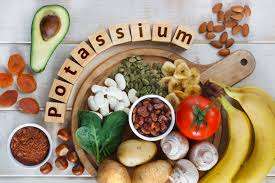- Your cart is empty
- Continue Shopping
Signs of potassium deficiency

Why You Need to Pay Attention to Potassium
We often hear about the importance of getting enough calcium, iron, and vitamin D. But there’s one mineral that tends to fly under the radar, despite being absolutely essential for our health: potassium. Potassium is a vital electrolyte and mineral that plays a crucial role in everything from muscle function and heart health to regulating fluid balance and blood pressure. Yet, many of us are unknowingly deficient in this mighty mineral – and the consequences can be serious.
The Dangers of Potassium Deficiency
Also known as hypokalemia, potassium deficiency can wreak havoc on the body. Symptoms like muscle weakness, fatigue, cramping, and constipation are just the tip of the iceberg. Left unchecked, hypokalemia increases your risk of high blood pressure, kidney stones, bone loss, and even cardiac arrhythmias that could prove fatal. The causes of potassium deficiency are varied. Everything from chronic vomiting or diarrhea to excessive sweating, eating disorders, certain medications (like diuretics), and underlying conditions like inflammatory bowel disease or kidney disorders can deplete your potassium stores.
Who’s at Risk?
While anyone can develop hypokalemia, certain groups are at higher risk. Those with pica (the persistent eating of non-food substances like clay or ice, which can bind to potassium), people taking diuretics or laxatives, and individuals with magnesium deficiency are particularly vulnerable. Even something as seemingly innocuous as following a very low-carb or ketogenic diet can increase your risk of potassium deficiency if you’re not carefully monitoring your intake.
Replenishing Your Potassium Stores
The good news is that potassium deficiency is easily diagnosed through a simple blood test – and it’s highly treatable. In cases of severe hypokalemia, intravenous potassium may be necessary, but for most people, increasing dietary potassium intake and taking supplements can help restore healthy levels. Some of the best dietary sources of potassium include:
- Fruits like bananas, oranges, apricots, and avocados
- Vegetables like potatoes, tomatoes, spinach, and sweet potatoes
- Beans, lentils, and peas
- Nuts and seeds
- Dairy products like milk and yogurt
- Whole grains like brown rice and quinoa
By incorporating more of these potassium-rich foods into your diet and being mindful of factors that can deplete your stores, you can help ensure you’re getting enough of this vital mineral.
Don’t Overlook Potassium
While it may not get as much attention as some other nutrients, potassium is essential for overall health and well-being. From supporting muscle function and heart health to regulating fluid balance and blood pressure, this mighty mineral plays a crucial role in keeping our bodies running smoothly. So, the next time you’re evaluating your nutrient intake, be sure to give potassium the attention it deserves. Your body will thank you for it.

